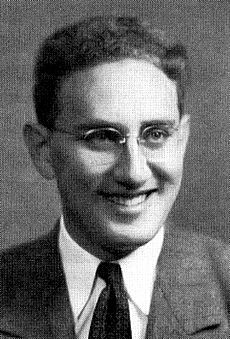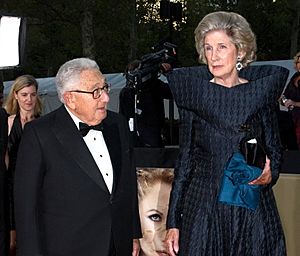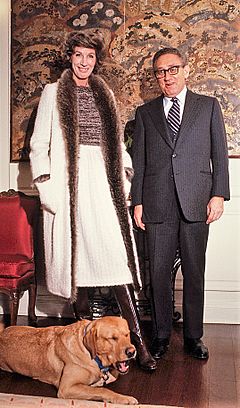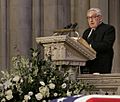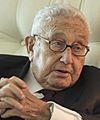Henry Kissinger facts for kids
Quick facts for kids
Henry Kissinger
|
|
|---|---|
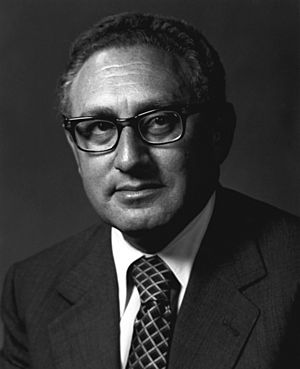
Official portrait, c. 1973
|
|
| 56th United States Secretary of State | |
| In office September 22, 1973 – January 20, 1977 |
|
| President | |
| Deputy |
|
| Preceded by | William Rogers |
| Succeeded by | Cyrus Vance |
| 7th United States National Security Advisor | |
| In office January 20, 1969 – November 3, 1975 |
|
| President |
|
| Deputy |
|
| Preceded by | Walt Rostow |
| Succeeded by | Brent Scowcroft |
| 22nd Chancellor of the College of William & Mary | |
| In office July 1, 2000 – October 1, 2005 |
|
| President |
|
| Preceded by | Margaret Thatcher |
| Succeeded by | Sandra Day O'Connor |
| Chair of the 9/11 Commission | |
| In office November 27, 2002 – December 14, 2002 |
|
| President | George W. Bush |
| Deputy | |
| Preceded by | Position established |
| Succeeded by | Thomas Kean |
| Personal details | |
| Born |
Heinz Alfred Kissinger
May 27, 1923 Fürth, Weimar Republic (now Germany) |
| Died | November 29, 2023 (aged 100) Connecticut, U.S. |
| Citizenship |
|
| Political party | Republican |
| Spouses |
|
| Children | 2 |
| Education | |
| Occupation |
|
| Civilian awards | Nobel Peace Prize (1973) |
| Signature | |
| Military service | |
| Branch/service | United States Army |
| Years of service | 1943–1946 |
| Rank | Sergeant |
| Unit |
|
| Battles/wars | |
| Military awards | Bronze Star |
Henry Alfred Kissinger (pronounced KISS-in-jer) was a famous American diplomat and politician. He was born Heinz Alfred Kissinger in Germany on May 27, 1923, and passed away on November 29, 2023. He served as the Secretary of State and National Security Advisor for Presidents Richard Nixon and Gerald Ford.
Kissinger was awarded the 1973 Nobel Peace Prize. This was for his important work in helping to arrange a ceasefire in the Vietnam War. He is remembered for his smart and sometimes controversial approach to foreign policy.
Contents
Early Life and Education
Growing Up in Germany
Henry Kissinger was born in Fürth, Germany, on May 27, 1923. His family was German-Jewish. His father, Louis Kissinger, was a schoolteacher. Henry also had a younger brother named Walter.
When Henry was nine, Adolf Hitler became Chancellor of Germany in 1933. This was a big change for his family. During the time of Nazi rule, Henry and his friends faced harassment. They were sometimes beaten by groups like the Hitler Youth. Henry would sometimes sneak into soccer stadiums to watch games. This was against the rules for Jewish people.
Because of the Nazis' anti-Jewish laws, Henry could not go to a good school. His father also lost his teaching job.
Moving to America
To escape the Nazis, Henry and his family left Germany on August 20, 1938. Henry was 15 years old. They briefly stopped in London before arriving in New York City on September 5.
Henry quickly learned American ways. However, he kept his German accent. This was partly because he was shy as a child. After his first year of high school, he started going to school at night. During the day, he worked in a factory.
After high school, Henry studied accounting at the City College of New York. He was a very good student. In 1943, his studies were paused when he joined the U.S. Army.
Serving in the U.S. Army
Military Training and Citizenship
Henry Kissinger began his basic training in South Carolina. On June 19, 1943, when he was 20, he became a naturalized American citizen. The army first sent him to study engineering. But this program was canceled.
He was then sent to the 84th Infantry Division. Here, he met Fritz Kraemer, another German immigrant. Kraemer noticed Henry's intelligence and his ability to speak German. He arranged for Henry to join the military intelligence section.
World War II Service
Henry saw combat during World War II. He volunteered for dangerous intelligence tasks during the Battle of the Bulge. As American forces moved into Germany, Henry was put in charge of the city of Krefeld. This was because few soldiers spoke German. Even though he was a private, he quickly set up a civilian government.
Later, Henry joined the Counter Intelligence Corps (CIC). He became a special agent. He led a team in Hanover that looked for Gestapo officers. For this work, he received the Bronze Star. In 1945, he was put in charge of cleaning up Nazi influences in the Bensheim district.
In 1946, Henry taught at an intelligence school. He continued this role as a civilian after leaving the army. He later said his time in the army made him "feel like an American."
Academic Career and Early Influence
Studying at Harvard
After his military service, Henry Kissinger went to Harvard College. He graduated in 1950. He then earned his Master's and Ph.D. degrees from Harvard in 1951 and 1954.
He stayed at Harvard as a professor. He directed the Harvard International Seminar for many years. He also worked as a consultant for the National Security Council.
Writing and Research
In 1957, he published his book Nuclear Weapons and Foreign Policy. From 1956 to 1958, he worked for the Rockefeller Brothers Fund. He also helped start the Weatherhead Center for International Affairs at Harvard.
Henry Kissinger also advised several government groups. These included the Department of State and the RAND Corporation.
Key Role in Foreign Policy
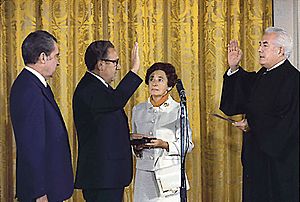
Advisor to Presidents
Henry Kissinger first advised Nelson Rockefeller's presidential campaigns. In January 1969, when Richard Nixon became president, Kissinger was appointed National Security Advisor. He later became Secretary of State. He continued in this role under President Gerald Ford.
Kissinger and President Nixon worked very closely together. Their relationship was very strong.
Shaping U.S. Diplomacy
Kissinger was a key figure in American foreign policy from 1969 to 1977. He helped create a policy called "détente" with the Soviet Union. This policy aimed to reduce tensions between the U.S. and the Soviet Union.
He also made secret trips to China. These trips prepared the way for President Nixon's historic visit to China in 1972. This visit helped create a new relationship between China and the United States. It led to more trade and cultural exchanges.
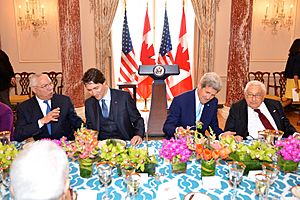
Nobel Peace Prize
On December 10, 1973, Kissinger was awarded the Nobel Peace Prize. He shared it with Lê Đức Thọ from Vietnam. They received the award for their efforts to negotiate a ceasefire and the withdrawal of U.S. troops from Vietnam.
Lê Đức Thọ did not accept the award. He felt that true peace had not yet come to South Vietnam. Kissinger accepted the award and gave the money to children of American service members who were killed or missing in action.
Later Years and Legacy
After leaving government, Henry Kissinger started his own company, Kissinger Associates. It was a consulting firm focused on international relations. He also wrote many books about diplomacy and world affairs.
A 2015 survey ranked Kissinger as one of the most effective U.S. Secretaries of State in the past 50 years. He passed away on November 29, 2023, at the age of 100.
Family and Personal Life
Henry Kissinger married Ann Fleischer in 1949. They had two children, Elizabeth and David. They divorced in 1964. In 1974, he married Nancy Maginnes. They lived in Connecticut and New York City.
His son, David Kissinger, became an executive in the entertainment industry. In 1982, Henry Kissinger had heart surgery. On May 27, 2023, he celebrated his 100th birthday.
Love for Soccer
Henry Kissinger was a big fan of soccer. He especially loved his hometown team, SpVgg Greuther Fürth. Even when he was a high-ranking official, the German Embassy would tell him his team's scores every Monday.
He was also named chairman of the North American Soccer League board in 1978. Many people say he helped soccer grow in the United States.
Interesting Facts About Henry Kissinger
- Kissinger described the game Diplomacy as his favorite in a 1973 interview.
- His college thesis was over 400 pages long. This led to a rule at Harvard limiting the length of theses.
Awards and Honors
- In 1973, he received the U.S. Senator John Heinz Award for Public Service.
- In 1976, he became the first honorary member of the Harlem Globetrotters.
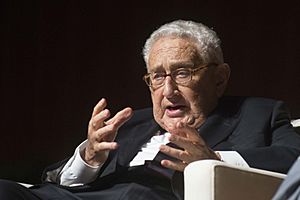
- On January 13, 1977, President Gerald Ford gave him the Presidential Medal of Freedom. This is one of the highest civilian awards in the U.S.
- In 1980, he won the National Book Award for his book The White House Years.
- In 1986, he received the Medal of Liberty.
- In 2002, he became an honorary member of the International Olympic Committee.
- In 2012, he was awarded Israel's President's Medal.
- He was a member of many important groups, like the Council on Foreign Relations.
Notable Works
Memoirs
- 1979. The White House Years.
- 1982. Years of Upheaval.
- 1999. Years of Renewal.
Books on Public Policy
- 1957. Nuclear Weapons and Foreign Policy.
- 1994. Diplomacy.
- 2011. On China.
- 2014. World Order.
Other Books
- 2022. Leadership: Six Studies in World Strategy.
Images for kids
-
Kissinger, shown here with Zhou Enlai and Mao Zedong, negotiated rapprochement with China.
-
Kissinger and President Richard Nixon discussing the Vietnam situation in Camp David, 1972 (with Alexander Haig)
-
President Ford, General Secretary Leonid Brezhnev, and Kissinger speaking informally at the Vladivostok Summit in 1974
-
On October 31, 1973, Egyptian Foreign Minister Ismail Fahmi (left) meets with Richard Nixon (middle) and Henry Kissinger (right), about a week after the end of fighting in the Yom Kippur War.
-
Kissinger and King Faisal of Saudi Arabia in Riyadh on March 19, 1975. In the far background behind Faisal is his half-brother, the future King Fahd.
-
Ford and Kissinger conversing on the White House grounds, August 1974
-
Chilean President Augusto Pinochet shaking hands with Kissinger in 1976
-
Suharto with Gerald Ford and Kissinger in Jakarta on December 6, 1975, one day before the Indonesian invasion of East Timor
-
Kissinger meeting with President Ronald Reagan in the White House family quarters, 1981
-
Kissinger and U.S. Vice President Joe Biden at the Munich Security Conference in February 2009
-
Kissinger with German Chancellor Angela Merkel on June 21, 2017
-
President Donald Trump meeting with Kissinger on May 10, 2017
-
President Barack Obama discussing the New START Treaty between the U.S. and Russia, 2010
-
Kissinger speaking during Gerald Ford's funeral in January 2007
-
Angela Merkel and Kissinger were at the state funeral for former German Chancellor Helmut Schmidt, November 23, 2015.
See also
 In Spanish: Henry Kissinger para niños
In Spanish: Henry Kissinger para niños
- List of foreign-born United States Cabinet members
 | William Lucy |
 | Charles Hayes |
 | Cleveland Robinson |


